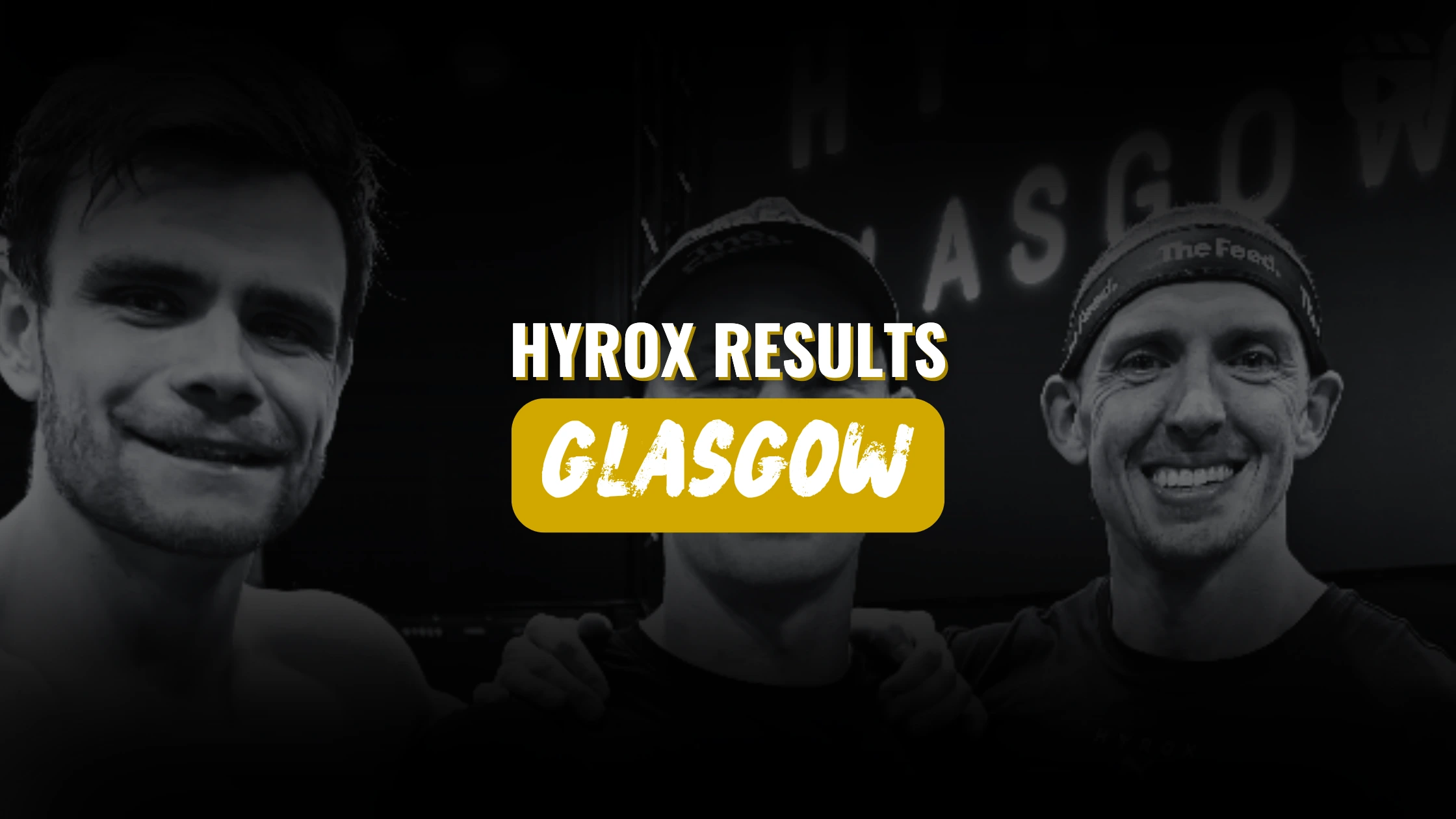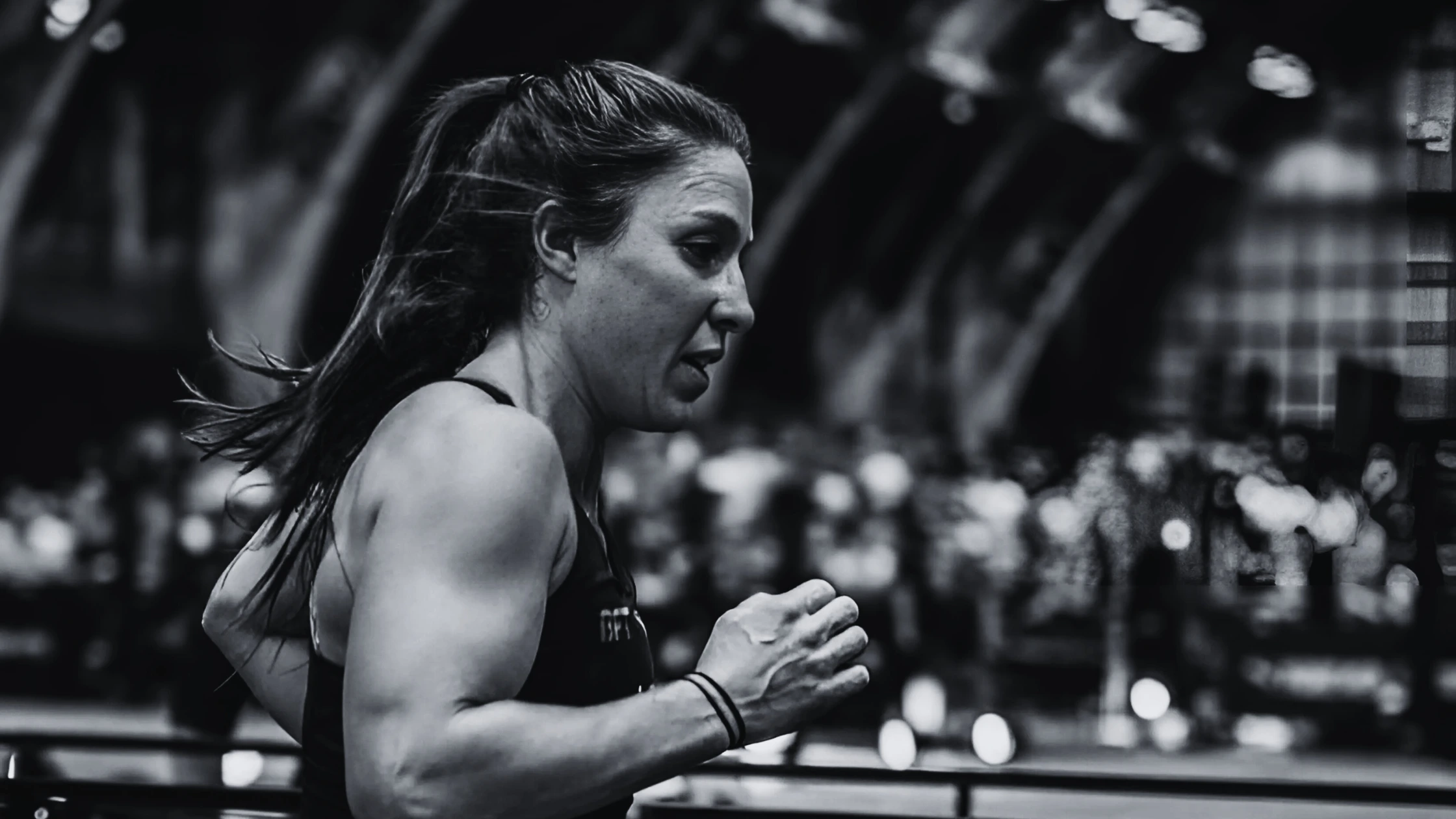Lauren Weeks made history at HYROX Glasgow 2025 when she broke the women’s world record with an incredible time of 56m 22s. James Kelly put on a spectacular show in the men’s elite division. His time of 53m 22s came close to breaking the world record. Both divisions saw remarkable displays of athletic excellence.
Tim Wenisch and Rich Ryan delivered standout performances in the men’s competition, clocking impressive times of 54m 30s and 54m 53s. The women’s race stayed intense until the final stretch as Joanna Wietrzyk pushed Weeks hard, finishing just 26 seconds behind at 56m 48s. HYROX Glasgow 2025 results proved it to be one of the year’s most competitive events. Over five days, 19,000 athletes competed, while nine athletes battled for the remaining World Championship spots.
HYROX Glasgow Men’s Results
HYROX Glasgow 2025’s men’s competition brought unexpected drama as underdogs stepped into the spotlight. Athletes who previously competed behind champions now showed their true potential on the global stage.
Tim Wenisch grabbed second place with a stellar personal best of 54:31. He managed to keep his position steadily throughout the race and showed great consistency at every station. Rich Ryan made a smart late-race push and claimed the final podium spot, clocking 54:54. Ryan’s breakthrough became vital when he qualified for the World Championships. His big moment came when he made his move during the lunges and held strong through the wall balls to lock in his podium finish.
Jake Dearden’s World Championship qualification story became the talk of the competition. The English athlete landed sixth place with a personal best of 55:44 and earned his dream spot at the World Championships.
Dearden’s start wasn’t great as he struggled early in the race. His performance changed after the burpee station where he found his groove and powered through the second half. His focus on better wall balls, sparked by his rivalry with Beau Wills, helped him secure that qualification spot.
Some big names had a rough day at the competition. Michael Sandbach and Jonathan Wynn, both predicted to do well, had to drop out before finishing. Their exit opened doors for other athletes to move up.
The last qualifying spot sparked some drama. Sean Noble seemed to have beaten Tomas Tvrdik for the final World Championship place as both athletes clocked similar times of 56:03. A later check showed Noble had done 99 wall balls instead of the required 100, which gave Tvrdik the final spot.
The elite men’s final standings showed how intense the day was:
- James Kelly – 53:23
- Tim Wenisch – 54:31
- Rich Ryan – 54:54
- Beau Wills – 55:02
- Pelayo Menendez – 55:23
- Jake Dearden – 55:44
These results altered the qualification map for the upcoming World Championships in Chicago. Athletes earned their spots through amazing performances rather than past reputation.
HYROX Glasgow Women’s Results
The women’s competition at HYROX Glasgow 2025 marked a turning point in the sport’s rise. Athletes showed exceptional performances that highlighted new talent in the field. The event showed how female competitors have grown stronger at the elite level.
Lauren Weeks set a new world record of 56:23 in Glasgow. She beat her previous time of 58:03 from Vienna. The American athlete took control after the rowing station and never looked back. Weeks wasn’t sure about being “HYROX race-ready” early in the season. She broadened her off-season training to include road races, trail events, and obstacle course competitions. This complete approach boosted her adaptability and led to her record-breaking run.
Joanna Wietrzyk climbed to elite status at just 22 years old. She found HYROX only four months before her breakthrough in Hong Kong, where she clocked an impressive 59:58. Her background in competitive tennis and distance running made her transition to HYROX smoother.
Wietrzyk finished second in Glasgow with a time of 56:49, also breaking the previous world record. She set a new age-group record for the 16-24 category. Her success comes from focusing on recovery basics:
- Sleeping 8-10 hours
- Managing hydration carefully
- Planning nutrition strategically
Women’s HYROX competition keeps getting stronger. Meg Jacoby was one of the first women to finish under one hour, and now she competes full-time. The sport adopted World Anti-Doping Agency standards this year, showing its commitment to professional standards.
Glasgow saw amazing depth in competition. Six women finished under 1:01:00. Here are the final results:
- Lauren Weeks – 56:23
- Joanna Wietrzyk – 56:49
- Vivian Tafuto – 59:37
- Seka Arning – 1:00:27
- Linda Meier – 1:00:49
- Lucy Procter – 1:00:57
The event mixes running segments with functional workout stations. This format draws athletes from many sporting backgrounds. When these talents meet, they raise the bar higher. Multiple athletes broke previous records in one event, showing how far the sport has come.
Winning Strategies at HYROX Glasgow 2025
Athletes at HYROX Glasgow 2025 broke records by using sophisticated strategies that showed the rise of competitive fitness racing. Their calculated approaches and mental preparation were vital factors in achieving exceptional results.
James Kelly’s background as a hybrid fitness coach and experienced runner in cross-country, track, and marathon disciplines shaped his race strategy. He matched pace with Tim Wenisch, Hunter McIntyre, and Michael Sandbach during the first half.
Kelly took control at the burpees station and kept his lead throughout the race. He showed his dominance when he lapped both Wenisch and McIntyre during the running segments. His calculated performance led to a personal best time of 53:23, just one second away from the world record.
The Australian athlete’s success came from his focus on:
- Threshold running development
- Endurance-building techniques
- Race-specific adaptations
Three-time world champion Lauren Weeks used specific strategies that led her to a new world record. Her approach to the Glasgow competition reflected several years of refined training methods and tactical development.
Weeks’ racing philosophy focused on precise control over effort distribution. She keeps about 85% of her training at low intensity and only 5% at maximum effort. This careful approach to energy management helped her set the record.
The champion’s tactical framework included several key elements that led to her win. She focused on machine efficiency, especially on the SkiErg and rowing stations. “The amount of time that you can gain on one of those machines versus what it does to you physically is not worth it,” Weeks explained.
Weeks battled strategically with Joanna Wietrzyk, trading the lead position early in the race. She took control after the rowing station and held it until her world-record finish of 56:23.
Her preparation went beyond physical training and included:
- Calculated rest periods between high-intensity efforts
- Strategic pacing on technical stations
- Efficient transitions between exercises
Weeks’ achievement stands out even more because she is a mother who takes care of her two-and-a-half-year-old daughter. She balances these responsibilities with professional athletic pursuits, which shows the mental strength needed for elite performance.
Kelly’s and Weeks’ strategies at HYROX Glasgow 2025 represent the growing sophistication of competitive fitness racing. Their performances show how detailed preparation, tactical awareness, and psychological resilience combine to create exceptional results at the sport’s highest level.
Station Performance Determined HYROX Glasgow 2025 Results
Station performances at HYROX Glasgow 2025 showed vital technical elements that shaped the final standings. Athletes’ data revealed patterns that determined success in different parts of the competition.
Sled Push and Pull
The sled stations became turning points where athletes won or lost valuable time. Athletes faced a challenging carpet surface that made the sleds feel much heavier than their actual weights. Men’s pro division competitors tackled a 153kg sled pull, while women’s pro athletes worked with 103kg.
Tim Wenisch showed exceptional skill in the sled segments. He completed the push in 1:56 and the pull in 3:18. Many athletes struggled with rope management at the pull station. The 12.5-meter rope length and tight standing area of 1.8 meters created technical hurdles.
Wall Ball Efficiency
The wall ball station, the final challenge, determined podium positions. Athletes faced this test after seven previous stations and running segments, making technique and mental focus crucial. They had to complete 100 repetitions with precise form:
- Full squat depth below the knees
- Accurate throws to the target center
- Quick ball-catching technique
Jake Dearden’s targeted wall ball training played a key role in his successful qualification. As fatigue set in, the technical demands increased. Judges strictly enforced movement standards, issuing no-reps for incomplete movements.
Running Segments Prove Decisive in Final Standings
Top performers showed different pacing strategies in running segments. Elite athletes managed to keep steady split times throughout runs 2-7. Average competitors varied more in their pace. Data showed that top-5 finishers carefully planned their first-run pace compared to their overall running split times.
Running segment stats highlighted smart pacing strategies:
- Elite performers averaged 4:45 in first runs
- Steady middle segment times led to podium finishes
- Final running segment times went up by 30-45 seconds due to tiredness
This breakdown of station performances highlighted HYROX success factors. Athletes who did well showed physical strength and technical skill in various challenges. Their mix of strength, endurance, and smart tactics ended up determining final standings at HYROX Glasgow 2025.
HYROX Glasgow to World Championship
HYROX Glasgow 2025 has altered the map of qualifications for the upcoming World Championships in Chicago. The event brought a fundamental change to the competitive structure and set new standards for elite athletes around the world.
The Glasgow competition left three coveted spots open for the HYROX World Championship Elite division. Athletes will compete for these final positions at the Last Chance Qualifier (LCQ) event in Barcelona during April 2025. The LCQ is a chance for any athlete to compete without meeting prior qualification requirements.
This season’s qualification process has become more competitive than ever. Nine athletes have already locked their positions in the Elite 15 division. Athletes can qualify through several paths:
- Automatic qualification through 2023/24 Season Elite 15 results
- Major event victories from Chicago, Stockholm, Vienna, and Washington DC
- Top three finishers from previous World Championships, extending to fifth place if major winners occupy podium positions
Athletes need two best individual Pro performances within the last 365 days. Their average times determine who advances to the championship stage.
Athletes Now Preparing for Houston Doubles
Athletes must quickly recover after Glasgow before heading to the Houston event on March 15-16, 2025. Houston brings something new to the championship series – the first-ever Elite 15 Doubles World Championship.
Athletes qualify for the Doubles Championship through five seasonal events, with the top three finishers in each race earning their spots. To prepare, athletes must focus on:
- Optimizing individual performance
- Training for partner synchronization
- Managing recovery between events
HYROX has expanded rapidly since its inaugural event in Leipzig, Germany, in 2018. Every competition follows the same standardized format worldwide:
- Eight 1-kilometer running segments
- Eight functional workout stations
- Indoor venues for an optimal spectator experience
Qualification spots are allocated based on participant numbers at each event. Athletes must confirm their participation within 48 hours of receiving their qualification notice, or the spot is passed to the next eligible competitor.
Final Words
The HYROX Glasgow 2025 results showcased remarkable performances. In the Men’s Elite 15 division, James Kelly narrowly missing a world record by just one second, finishing at 53:23. In the Women’s Elite 15 race, Lauren Weeks set a new world record with a time of 56:23.



1 thought on “HYROX Glasgow 2025 Results”
Comments are closed.